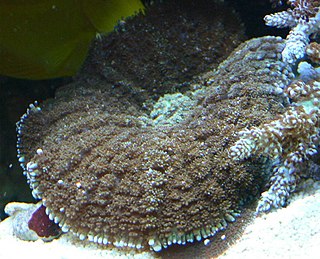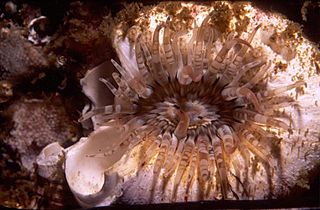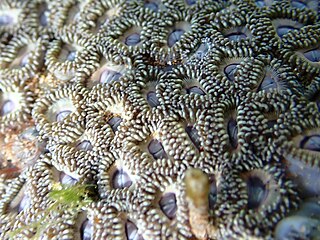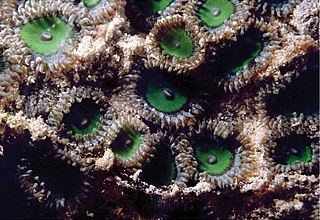
Zoanthids are an order of cnidarians commonly found in coral reefs, the deep sea and many other marine environments around the world. These animals come in a variety of different colonizing formations and in numerous different colors. They can be found as individual polyps, attached by a fleshy stolon or a mat that can be created from small pieces of sediment, sand and rock. The term "zoanthid" refers to all animals within this order Zoantharia, and should not be confused with "Zoanthus", which is one genus within Zoantharia.

Rhodactis is genus of mushroom corals which are characterized by large individual polyps that are often reminiscent of a mushroom. Rhodactis are related to stony corals but do not produce a stony skeleton.

Calvadosia is a genus of stalked jellyfish in the order Stauromedusae. It is the only genus in the monotypic family Kishinouyeidae.

Nemanthus is a genus of sea anemones. It is the only genus in the monotypic family Nemanthidae.

Sagartiidae is a family of sea anemones.

Anthothoe is a genus of sea anemones in the family Sagartiidae.

Anthostella is a genus of sea anemones in the family Actiniidae. It has two described species.

Pseudactinia is a genus of sea anemones in the family Actiniidae.

Isozoanthus is a genus of anemone-like anthozoans in the order Zoantharia.

Parazoanthus is a genus of anemone-like anthozoans in the order Zoantharia.

Peachia is a genus of sea anemone in the family Haloclavidae. Members of this genus typically burrow into soft substrates. The only part of the animal that is normally visible is the oral disc and tentacles which lie flat on the sand in a star shape. The type species is Peachia cylindrica.

Isanthus is a genus of sea anemones in the family Isanthidae.

Palythoa is a genus of anthozoans in the order Zoantharia.

Sagartiogeton is a genus of sea anemones in the family Sagartiidae.

Zoanthus gigantus is a zoanthid first described from southern Japan.

Zoanthus kuroshio is a species of zoanthid first described from southern Japan.

Ricordea is genus of corals. It is the only genus in the monotypic family Ricordeidae.

Zoanthus sansibaricus is a species of zoanthid generally found in the Indo-pacific but also off the western coast of South America. The range of habitation has been noted in intertidal zones along with areas below 7 m, but shows phenotypical and morphological differences based on depth and shading. Shaded individuals contain larger polyps compared to unshaded. It can be divided into three reproductive categories, male, female and asexual. Spawning has been observed within the middle of July, using lunar phases as an indicator. Various subclades are theorized to appear based on the time of year.

Cribrinopsis is a genus of cnidarians belonging to the family Actiniidae.
Urticina is a genus of sea anemones in the family Actiniidae.




















